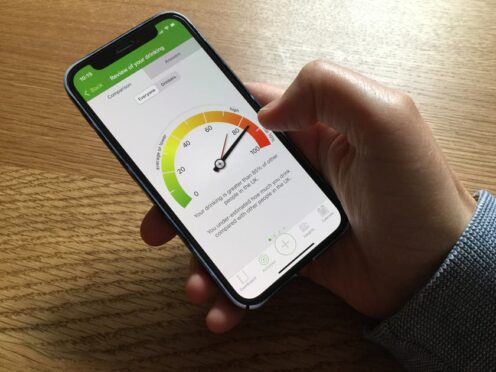An app that keeps track of how much a person is drinking could help reduce their alcohol intake by around two units a week – equivalent to a medium glass of wine, scientists say.
Researchers at UCL said their Drink Less app, which is available to download for free on Apple devices, can help people who are high-risk drinkers by allowing them to set goals, record how much they drink, and log their mood and sleep quality after drinking.
Their study, involving more than 5,000 people, found those randomly recommended to use the Drink Less app reduced their drinking by 39 units a week at six months.
This was equivalent to two fewer units a week on average when compared to a control group who were referred to standard NHS advice.

Women were found to benefit more from the app, according to the research, many of whom reduced their drinking by an additional 2.5 units a week, when compared to those who were referred to the NHS advice webpage.
The experts said that while an extra two units a week may seem small, the outcomes can be significant, “both in terms of preventing potential health harms as well as reducing costs to the NHS”.
Lead author Dr Melissa Oldham, of the UCL Institute of Epidemiology and Health Care, said: “These results show that the Drink Less app can be useful for people looking to reduce their alcohol consumption.
“Alcohol consumption can lead to many health conditions such as cancer and cardiovascular disease.
“About 20% of the adult population in the UK drink alcohol at levels that increase their risk of ill health and the Drink Less app could help these people to cut down.
The NHS recommends people should not drink more than 14 units of alcohol a week, spread across three days or more.
That is around six medium (175ml) glasses of wine, or six pints of 4% beer.
The NHS also has its own Drink Free Days app to help people cut down on alcohol intake.
There are other apps out there too, such as alcohol education charity Drinkaware’s MyDrinkaware App, which has had more than 100,000 downloads on Google Play.
Dr Claire Garnett, of UCL Institute of Epidemiology & Health Care and the University of Bristol, who led a team in developing the app while at UCL, said: “Many apps offer to support people to cut down their drinking but this is the first randomised controlled trial of an alcohol reduction app for the general population in the UK.
“If people are going to use an app, it would be better if they tried one that had good evidence behind it.
“An app that is not effective may make it less likely for that person to try to reduce their drinking in future.”
Dr Sadie Boniface, head of research at the Institute of Alcohol Studies said: “Nice (The National Institute for Health and Care Excellence) already recommends digital interventions as an add-on to existing services, so having an app which we know is effective is very welcome news.
“If the Drink Less app can be scaled up and rolled out more widely, it holds promise for population health.
“However, as is the case with a lot of digital health apps, decision-makers should be mindful that these don’t suit everybody.
“Apps are one valuable tool in the box, but there is no silver bullet for alcohol harm.
“What we really need is a national strategy that includes apps alongside other interventions and policies which we know work, such as making alcohol less cheap, not as readily available, less heavily marketed, and improving access to alcohol treatment and support.”
The research, published in eClinicalMedicine, was funded by the National Institute for Health and Care Research (NIHR).
